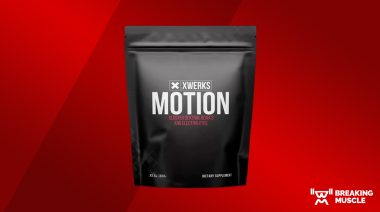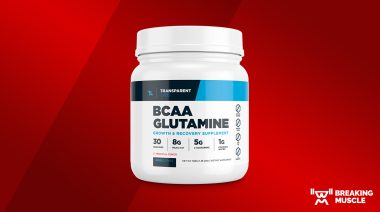
If you’ve been reading any of my more recent articles, you’re well aware of how important sleep is to optimal health. It supports our immune systems, cognition, hormone production, weight loss, and more. You name a goal and sleep is usually vital in meeting it. There are tons of tips and tricks and even medicines that support better sleep.
However, not until I encountered Progenex’s Cocoon had I tried a protein powder thought to improve sleep quality as well as support recovery. I’ll be honest, I wasn’t really buying it at first. Seriously, a protein powder is going to help me sleep? Uh huh. But, the marketing got the best of me and I bought a bag. I mean, what woman doesn’t want to look like Christmas Abbot while sleeping, all curled-up and recovering? I imagined myself waking up with super-ripped abs and maybe a full sleeve. You got this one right, Progenex marketing team!
As an aside, I actually like Progenex Recovery and More Muscle quite a lot as they do not wreck havoc on my stomach but I am always a skeptic first when it comes to supplements, no matter who makes them.
Well, Cocoon did not make me look like Christmas Abbot and not a single tattoo has yet to appear on my body. But it did most certainly make me sleep like a rock. And there’s no waiting weeks for the results. I was out like a light and slept the whole night through the first time I tried it. Now, I’m not an insomniac so I wasn’t fully convinced it wasn’t just me wanting it to work. So my hubby tried it out. He historically is a not-so-great sleeper. He has had sleep issues since he was a teen and will toss and turn usually a few nights a week and sometimes nightly when stress is high. So he gave it a try and experienced the same results. Drowsiness began about thirty to 45 minutes after taking Cocoon, and the sleep was sound. No grogginess the next morning either.
This made me wonder – what was in this stuff that made it work so well? There is, of course, the protein source, micellar casein. But there is also the mystery ingredient, metamorphagen. Micellar casein is a protein derived from dairy. The reason casein is recommended as a nighttime protein supplement is due to its slow digestion. When casein is eaten and exposed to stomach acid it curdles. The curdling keeps the protein from being digested quickly. Therefore, if you take it before bed, it will give you a nice supply of protein all night long.
So, theoretically, casein enhances your recovery and muscle-building capabilities. However, those with issues digesting dairy or who have food allergies should proceed with caution. Casein is one of those proteins that can really disagree with some people. I was a little concerned about this, but neither of the members of Team Bennington has yet to notice any GI issues.
Now, what the heck is Metamorphagen? That’s exactly what I thought to myself when I read the label. Metamorphagen is an l-tryptophan peptide. You may remember the article I wrote on peptides a while back. Basically, a peptide is a small part of an amino acid and enables faster absorption and enhanced effectiveness of the supplement, whatever it might be. In this case, the tryptophan peptide enables tryptophan to go to work faster and more efficiently, enhancing sleep and recovery.
But what is tryptophan, anyway? Tryptophan is an essential amino acid, which means we must get it from food or supplements as our bodies can’t actually produce it on it’s own. Tryptophan has been shown in multiple studies to speed sleep onset and decrease awakenings during the night. And if you know anything about sleep and recovery, you know getting good, quality sleep and enough of it is paramount in making sure your body recovers efficiently. Some coaches even recommend not training at all the next day if your sleep was less than adequate the night before.
Trytophan has also been linked improved moods. This could be attributed to several things, in my opinion. If tryptophan makes you sleep better, of course your mood will also be improved. Tryptophan is also a precursor for serotonin (which is precursor for melatonin), so when you have more tryptophan you make more serotonin. More serotonin means a happier you! And when you make more serotonin, you make more melatonin, which also leads to better sleep. It’s a win-win-win.
Tryptophan is found in animal and vegetable proteins and yes, in turkey. You may have heard that you get sleepy on Thanksgiving because of all the turkey and thus tryptophan we eat at Thanksgiving dinner. However, the amount of tryptophan in turkey is about the same as the amount in chicken. So, you can’t blame your Thanksgiving coma on turkey consumption. No, that you can chalk up to the dressing, cranberry sauce, and mass quantities of pie you ate – not the turkey.
So, why don’t we just eat a bunch of turkey (or other tryptophan-containing food) at night? Well, the recommended dose of tryptophan to induce sleep is somewhere between 1000 and 2000mg. Five ounces of turkey has a little less than 500mg of tryptophan in it. So, unless you want to eat about twenty ounces of turkey every night, it’s a little easier and less filling to take a supplement. And remember, a peptide works more quickly and efficiently to produce the desired result – in our case, enhanced sleep.
The tryptophan peptide in Cocoon seems to do just that – enhance sleep – or at least it did in my highly unscientific experiment. However, we haven’t been using it very long or in a controlled study, so it’s hard to gather objective data points on muscle recovery or athletic performance.
I’d love to hear others’ reviews and opinions on Cocoon. So, comment below and tell us if you noticed a difference, if it made you feel amazing, or even if it gave you a stomach ache. Let’s help each other find the best supplements to help each other perform, look, and feel our fittest! And if you want to try some out, feel free to use the discount code, “NOMS.”
Progenex Cocoon is available for $69.95 at ProgenexUSA.com.






